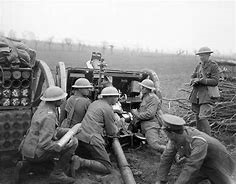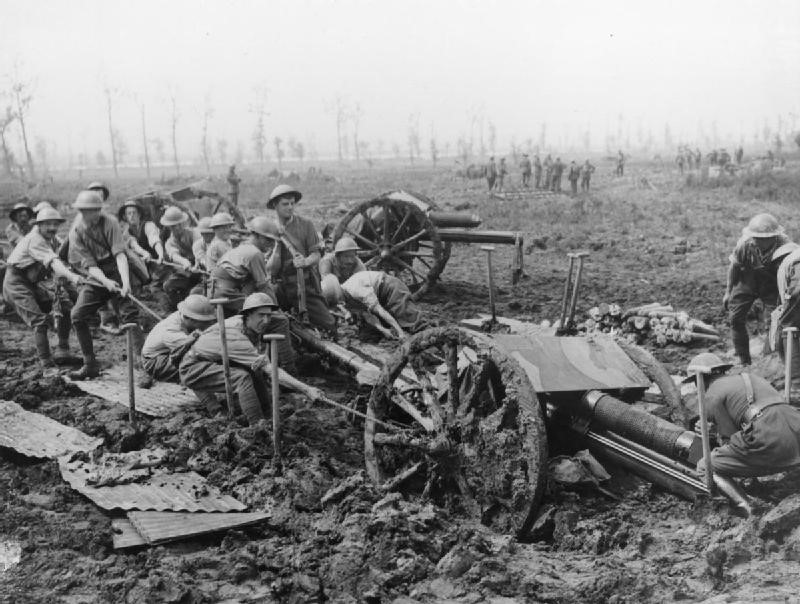BERNARD LUXFORD
Battery Sergeant Major, 56943, 129th Battery, Royal Field Artillery
Killed in Action at Vaulx, France, 10 September 1918, aged 27
Buried in Vaulx Hill British Cemetery, Pas de Calais, France
Grave Reference: Plot 1, Row J, Grave 12

The Royal Field Artillery
Bernard Luxford was born in Forest Row in the spring of 1891 and christened on 7 June 1891. His parents were William Peter and Mary Luxford. William Peter was the brother of Job Luxford, a prosperous local builder and contractor. Job's son Edward was Bernard Luxford's cousin and he was killed in action on 8 May 1918. Bernard's brother William was also killed in action on 23 November 1917 during the Battle of Cambrai.
At the time of the 1901 census Bernard was living at Woodbine Cottages, Forest Row. His father, William Peter, born in Maresfield, was recorded as a 44-year-old bricklayer, while his mother, Mary, was aged 40 and was born in Great Yarmouth, Norfolk. Bernard lived with his brothers Frank (14) and William (8) and his sisters Mary (6) and Ellen (2). Frank was recorded as a general labourer.
In the 1911 census Bernard is missing from the family recorded at Woodbine Cottages but the parents William Peter and Mary and their children Frank, William, Mary and Ellen are all present. Frank (24) was a bricklayer, William (18) an apprentice with a motor engineer, Mary (16) a dressmaker and Ellen was at school. Also recorded on the census form, completed on 2 April 1911, was Herbert Cook, an 18-year-old boarder, who was a domestic gardener born in East Grinstead. He was killed in action on 14 May 1916.
Bernard Luxford enlisted in 1914 and on 19 August 1914 he was a Corporal (later Warrant Officer Class 2) in the 30th Royal Field Artillery. The RFA, the longest arm of the artillery, provided artillery support for the British army. They were reasonably mobile and were mainly responsible for medium calibre guns and howitzers deployed close to the front line. They also provided the manpower for operating heavier mortars (the lighter trench mortars were usually manned by the infantry). The RFA were organised into brigades and were then attached to larger divisions.

The Royal Field Artillery battling through mud on the Western Front
As a Battery Sergeant Major Bernard Luxford was the senior warrant officer in a regiment or battalion with a senior management role. In this capacity he would be responsible under the company commander or second-in-command for all aspects of the duty and discipline of all Non-Commissioned Officers and men in that unit.
Bernard Luxford was killed in action at Vaulx-Vraucourt in the Pas de Calais region of northern France. He is buried in Vaulx Hill British Cemetery. This cemetery was started in September 1918 and then expanded after the Armistice with graves brought in from the smaller surrounding battlefields, including the Vraucourt Churchyard British Extension, which contained 185 British and 7 Australian graves from 1917 and 1918. According to the Commonwealth War Graves Commission his grave can be found at Plot 1, Row J, Grave 12. The inscription on the grave reads "The Lord Knoweth Them That Are His".

Vaulx Hill Cemetery
Bernard Luxford was awarded the Victory, British War Medal and Star.
In his will granted on 26 April 1919 Bernard left £284.0s.0d. to his mother Mary, widow of William Peter Luxford. A further War Gratuity of £31.0s.0d. was granted to Mary on 15 December 1919.
The memorial book in Holy Trinity Church in Forest Row was signed by his mother, Mary Luxford, of Woodbine Cottage, Forest Row.
Kevin Tillett
4 November 2018

